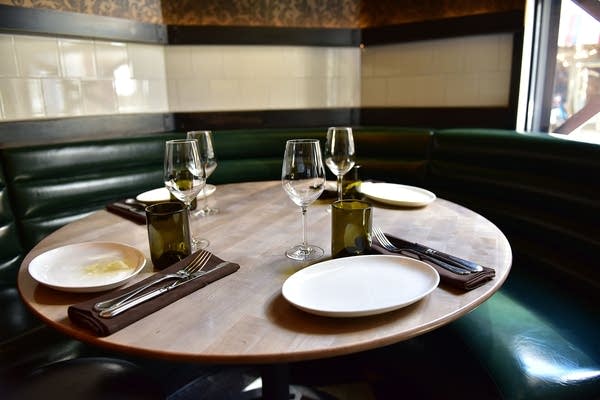Is the golden age of food over?

From Korean barbecue tacos to cream puffs filled with foie gras, the first decade of this century witnessed a culinary revolution in America. Chefs were experimenting and introducing diners to never-before-seen culinary creativity. Cities developed international reputations as dining capitals.
Is that golden age now over?
Marketplace’s David Brancaccio recently considered the question with Kevin Alexander, author of “Burn the Ice: The American Culinary Revolution and Its End.” The following is an edited transcript of their conversation.

David Brancaccio: You consider Portland, Oregon, the dawn of this “belle epoque” age of restaurants. But you offer two competing theories for how the powerful New York food critics and writers figured out Portland. Give me the first of those theories.
Kevin Alexander: The first was this major food conference that happened in the late 90s, and basically all of these chefs and a lot of food media ended up in Portland. It was late spring, and Portland at that time can be raining sideways for two weeks at a time, but it was perfect weather. They just set it all up beautifully and really that was when a lot of the chefs started to say: “What’s going on in Portland? They’ve got the vineyards right outside of the city and this food is actually incredible.” A lot of people point to this conference in the late 90s as first setting the table and planting the seed for what started to become this culinary revolution in Portland.
Brancaccio: OK. So that was one theory; everyone’s in a very good mood, they start writing nice articles about Portland, maybe that’s what happened. There is a competing conspiracy theory for how Portland, Oregon, gets noticed on the food scene. How does that one go?
Alexander: Did you see that movie “Sideways,” back then?
Brancaccio: Right, the wine movie with the embittered wine snob, he finally finds love in Northern California, right? That plays out into this this scenario for Portland, Oregon…?
Alexander: Yeah, absolutely. So the movie comes out. And famously in “Sideways,” Paul Giamatti’s character says: “I am not drinking any f—— merlot.” Merlot sales were already sort of on the decline, but you saw them drop off dramatically after that, and people needed another light red wine to drink. And pinot noir was that wine, and Oregon was set up perfectly for that. So what you really saw was the wine writers first coming out to Portland, and as they’re writing about pinot noir they’re saying: “Oh, the food here is really good, too.” So they tell their food writer buddies, “hey, you’ve got to check out Portland.” So really what it comes down to is that because Paul Giamatti’s character uttered those words about merlot, the entire food world changed.
Brancaccio: Why do you think this period was so ripe for pushing the food envelope?

Alexander: You saw this rise of this very specific style of restaurant, right. The Edison bulbs, and the reclaimed wood, and the farm-to-table food, and the craft cocktail programs, and it suddenly seemed like it was everywhere in America. So I wanted to trace that back. And I was looking for sort of that monkey-from-“Outbreak” moment. And when I did, I found that “patient zero” seemed to be Portland in 2006.
Brancaccio: It’s more than just a dining experience. This revolution that you described, it becomes economic development for cities. I mean, I’m from near the other Portland — Portland, Maine — and used to think of Portland as “Yeah, you know,” and now, you think of it as a foodie capital. You go just for that.
Alexander: Yeah, no, absolutely. And you saw it kind of happen all over the country. So what I really talk about is this “Portland-ization” of America. Portland created this template because they were sort of a culinary backwater before this. And all of a sudden, in 2006, they were these national food media darlings. And so other cities who didn’t have these long histories and culinary reputations started to say: “Well, look, if they can do it, why can’t we do it.” And all of these cities, you know, they started to have this energy and this creativity and it was really a really exciting time.
Brancaccio: I’m sad to hear the past tense in your voice but of course I’ve read the book, too. I mean, you make an argument that it was, past-tense, a golden age. Why are we not still living the magic?
Alexander: First of all, we haven’t had a recession in 11 years. In the world of restaurants, that means landlords can raise rents for 11 straight years. We have rising food costs. There’s a market saturation at this point. And as restaurant rents get more expensive, so do residential rents, which means workers getting priced out of these cities. And with less workers you’ve got increased competition. Workers are harder to find and keep, so they’re forced to simplify just to keep it moving. And so basically what all of these factors add up to is that specific restaurant that I’ve been talking about, the sort of central restaurant of this golden era, the independent fine-casual dining spot, they’re the first to go. They’re the ones that can’t survive.
Brancaccio: But the fact is right, there’s still pockets of innovation, still interesting stuff happening. But you’re talking broader brush, tectonic plates moving, you know, the major trend?
Alexander: Yes. I mean, just because this era is passing doesn’t mean we’re suddenly done with eating well. It’s not going away, it’s just going to evolve.










